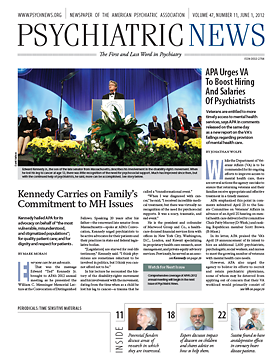If you say the word “catatonia,” many members of the public think of the 1990 movie “Awakenings” with Robert De Niro and Robin Williams in which patients’ stupor and rigidity were due to an encephalitis infection.
In general, however, psychiatrists think of catatonia as a subtype of schizophrenia.
To learn more about catatonia, Dolores Malaspina, M.D., a professor of psychiatry at New York University, and colleagues have conducted what appears to be the first prospective study to determine how catatonic schizophrenia resembles, or differs from, other types of schizophrenia.
They used data from an Israeli population study in which about 90,000 subjects had been followed from birth until ages 29 to 41. Of those subjects, 568 developed schizophrenia, and 43 of them (8 percent) developed catatonic schizophrenia. Malaspina and her team then compared subjects with catatonic schizophrenia with those with other types of schizophrenia and found several notable differences, they reported in the March Schizophrenia Bulletin.
Women and men were at comparable risk for catatonia, in contrast to other types of schizophrenia in which men were at higher risk. Advancing paternal age had no influence on risk for developing catatonia, in contrast to other types of schizophrenia where a link to paternal age has been identified. At the same time, those with catatonia were somewhat more likely to have mothers who were generally older when they gave birth to a child who later developed catatonia, which was not the case for subjects with other types of schizophrenia.
And most strikingly, individuals with catatonia were significantly more likely to attempt suicide than individuals with other forms of schizophrenia. “This is notable,” the researchers said, “because those with schizophrenia are already considered at high risk for suicide.” And as Malaspina stressed to Psychiatric News, “the high risk for suicidal ideation should be particularly noted by clinicians.”
“Our results lend support to the hypothesis that catatonic schizophrenia might be biologically distinct from other types of schizophrenia,” Malaspina and colleagues concluded. But exactly what biological mechanisms might contribute to such a subtype remain to be elucidated. Yet in two other studies, subjects with catatonic schizophrenia were found to have lower blood levels of brain-derived neurotrophic factor and higher blood levels of C-reactive protein than subjects with schizophrenia without catatonia.
Also to be determined, Malaspina told Psychiatric News, is whether the biological mechanisms that cause catatonia in individuals with schizophrenia are the same as those that cause catatonia in people without schizophrenia, since “catatonia as a condition can exist in many other disorders and perhaps even present alone.”
The study was funded by the National Institutes of Health and the Brain and Behavior Research Foundation (formerly NARSAD).

